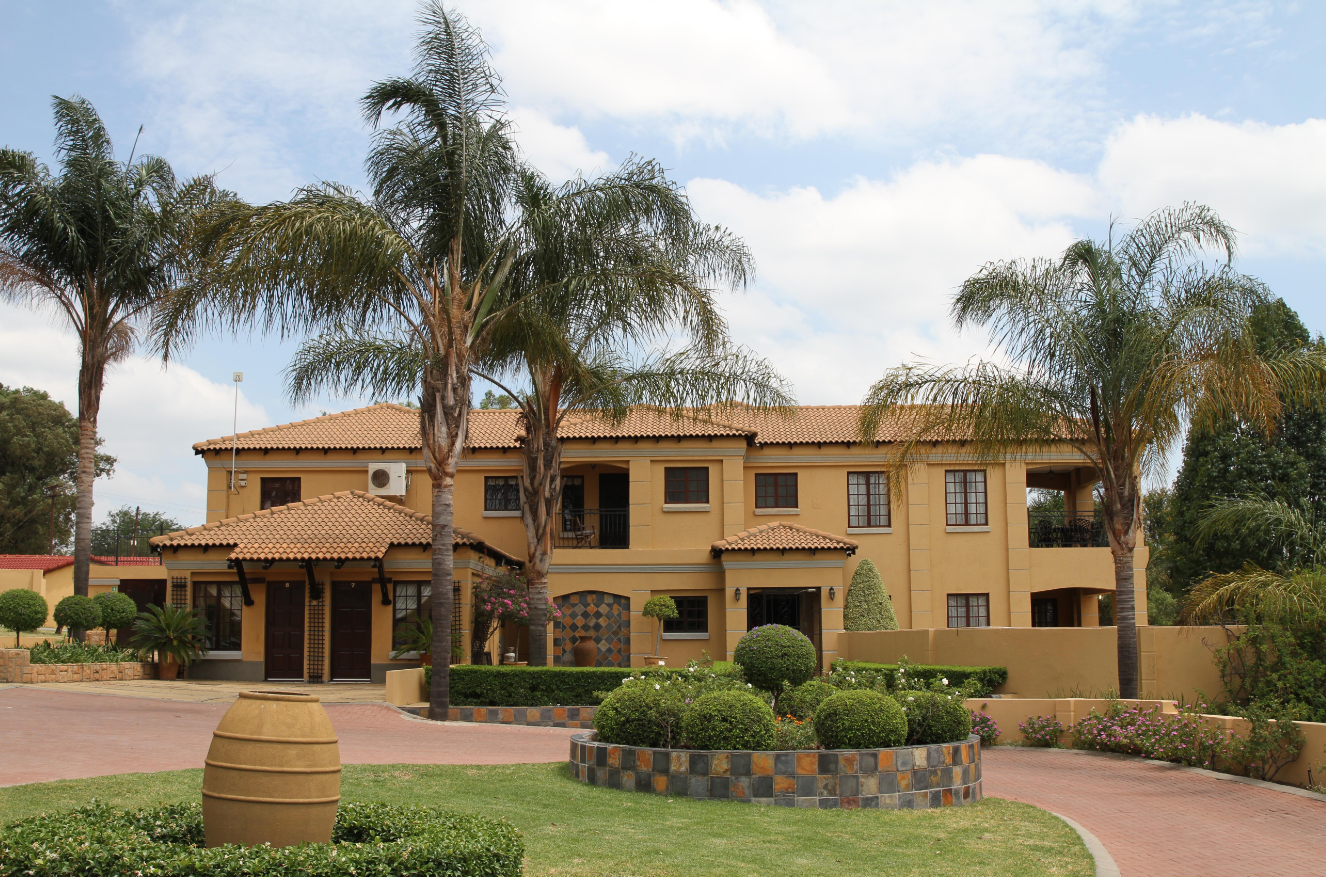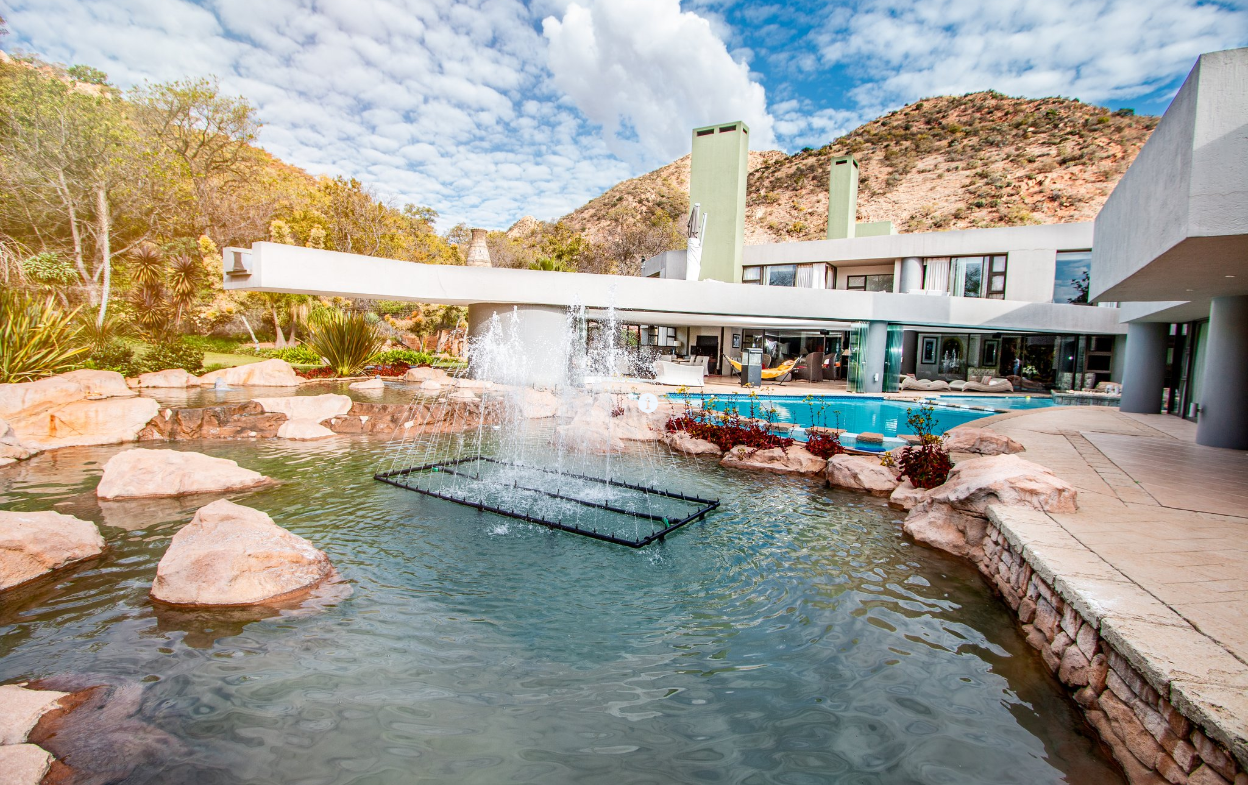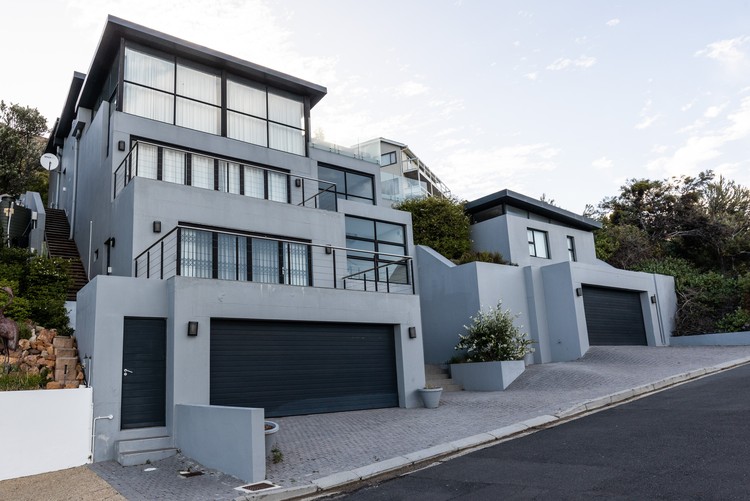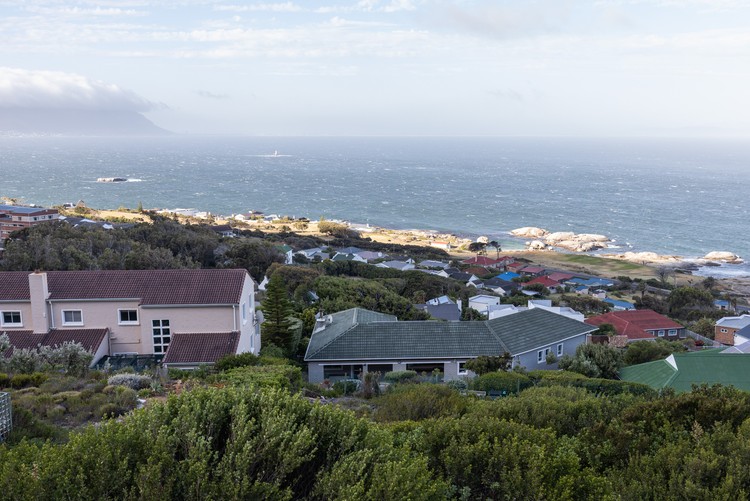How Lottery money was used to fund mansions for high flyers
Five luxury properties connected to misappropriated Lottery grants have been frozen by the Asset Forfeiture Unit
This luxurious mountainside mansion in Cape Town with sweeping views of Simon’s Town and False Bay was paid for with Lotto money meant to build toilets for schools in the Eastern Cape. Photo: Ashraf Hendricks
The view from the mansion. Photo: Ashraf Hendricks
A luxurious mountainside mansion with sweeping views of Simon’s Town and False Bay, owned by a trust controlled by dodgy Pretoria lawyer Lesley Ramulifho, was described as “five-star” when it was put up for auction a few years ago.
In rural Rustenburg, in North West, a magnificent boutique hotel on a property owned by a company belonging to former National Lotteries Commission (NLC) board member William Huma, lies in the picturesque foothills of the Kgaswane Nature Reserve Mountains.
And in Midrand, Gauteng, a luxury guest house with conference facilities set in a large garden with “a country feel” is owned by a company belonging to Kwaito star and music producer Arthur Mafokate.
The three properties, in different parts of South Africa, all have one thing in common: they were all bought using money from Lottery grants allocated to non-profit companies meant for good causes.
The properties were frozen after the National Prosecuting Authority’s Assets Forfeiture Unit (AFU) obtained a preservation order in terms of the Prevention of Organised Crime Act, based on evidence gathered by the Special Investigating Unit (SIU). The Act was promulgated in 1998 “to combat organised crime, money laundering and criminal gang activities.”
Also included in the preservation order are a luxury home in a gated estate in Pretoria owned by a trust controlled by former NLC legal manager Tsietsi Maselwa, and a nearly 14-hectare plot in Pretoria owned by former NLC board chairperson, businessman and pastor, Alfred Nevhutanda, and his pastor wife, Tshilidzi. Both of these properties were also paid for with misappropriated Lottery funds.
The SIU has been investigating corruption involving the NLC since President Cyril Ramaphosa signed a proclamation in October 2020.
In terms of the order, the owners are prohibited from “selling, disposing of, leasing, transferring, donating, or dealing in any manner whatsoever with respect to the immovable properties”.
Investigations revealed how money had been misappropriated from five non-profits that had received grant funding from the NLC of approximately R56.3-million meant for community development projects, the SIU said in a statement.
These are the South African Art and Development Association (SAADA), the Matieni Community Centre, Dinosys, Zibsicraft, and Taung Cultural Music and Arts Expo.
The AFU was granted the preservation order after an ex parte application to the Gauteng High Court on 21 December last year, which was only made public on 13 January. In such an application, notice is not given to the other party but there is usually a return date when the affected party can appear to argue against the order, and also present evidence
With the new year barely begun, the latest preservation order is a clear sign that the noose is continuing to tighten on people involved in the looting of the Lottery.
This is the latest application in a series of court-ordered preservation orders, like this one, that has seen the freezing of luxury homes, properties, a farm and vehicles bought with Lottery funds.
A farm owned by Ramulifho and a luxury estate owned by a company of which former NLC board chairperson Alfred Nevhutanda is the sole director were also frozen last year. And, the pension of former NLC chief operating officer Phillemon Letwaba has also been frozen.
Democratic Alliance member of parliament Mat Cuthbert, who has led the charge in Parliament in exposing Lottery corruption, congratulated the SIU but said that “there needs to be a greater urgency” from the National Prosecuting Authority (NPA) in charging and prosecuting members of the syndicate. “It is not enough for the funds to be recovered – these criminals must be placed behind bars,” he said in a statement.
The money to pay for the latest properties to be frozen was diverted from non-profit organisations (NPOs) that had been funded for a variety of projects.

This guest house in Midrand was partly paid for with Lotto grants given to kwaito star and music producer Arthur Mafokate. Photo from the guest house’s website
South African Art and Development Association
SAADA, an NPO headed up by kwaito star and music producer Arthur Mafokate, was registered in 2011 but appears to have limped along financially until it received grants totalling R9.3-million from the NLC in 2014 and 2015.
The funding was for a countrywide talent search competition and “to host workshops for upcoming artists to improve and uplift the standard of musicians in the music industry”, according to a report at the time. The workshops covered topics ranging “from refining talent, securing and managing recording deals, contracts, media interviews and marketing their music”.
The funding was paid in two tranches of R4.65-million each – the first on 28 October 2014, and the second on 13 November 2015. Before the first grant, SAADA had only R16,995 in its bank account and R57,638 before the second.
The SIU says that soon after the second Lottery payment was received, five payments totalling just over R4.5-million were transferred to Roadshow Marketing, owned by Mafokate, which in turn paid R4.4-million into “a home loan account” in November 2015.
On 20 January 2016, Mafokate then made an offer to purchase the Villa Rosa Guest House in Midrand via 999 Music, of which he is the sole director. The next day the SIU says that R4.3-million was then transferred from the home loan to 999 Music, which in turn transferred R675,000 and R361,000 to attorneys handling the purchase of the guest house by 999 Music.
The whistle was blown on the abuse of Lottery funding in 2015 by Brian Mokoena, the former secretary general of SAADA and chief operating officer of two of Mafokate’s companies – Roadshow Marketing and 999 music. Mokoena claimed that Lottery money was used to help buy the guest house, in an affidavit he deposed at the Midrand police station on 15 May 2015.
In his affidavit, Mokoena alleged that besides Lottery money being used for the guest house, vehicles paid for with the grant were used to ferry Mafokate’s artists, including his son, DJ AJ, and kwaito star Chomee, a fellow board member.
“Cameras, printers, laptops and furniture bought by SAADA ended up at his guesthouse. As the secretary-general, together with the board, we were sidelined from the activities of the NPO. The chairperson [Mafokate] operated and used the NPO at his own will. Thus the NPO ran as the personal fiefdom of Arthur Mafokate,” Mokoena said in his affidavit.
SAADA’s board members at the time included chairperson Mafokate, finance director Thulisile Madihlaba - Chomee, who was Mafokate’s girlfriend, Mokoena, who was secretary-general, and Mafokate’s sister, Rita Sidimba, the deputy secretary general.
“I am about to travel the whole country in discovering 1000 potential young people (100 per province and 100 that will be randomly picked) and workshop them about how to survive the music industry,” Mafokate posted on Instagram at the time.
Mokoena told GroundUp that he had confronted Mafokate about the use of Lottery funds for his personal use. “He was very arrogant and told me not to tell him what to do.” After the two fell out, Mokoena says he resigned and left “without a cent”.
Mokoena said he met several times with former NLC Commissioner Thabang Mampane, Letwaba, Nevhutanda, and Maselwa, and informed them that Lottery funds were being abused by Mafokate. “But nothing came of it. Mampane was very patronising to me. She told me to calm down and offered me a can of Sprite because she said that I needed to chill and bring up my sugar levels.”
Mokoena says he also met with former NLC board chairperson Nevhutanda and Mafokate about the matter. “Nevhutanda said he wanted to ‘sort it out’ but I was not interested. I did not want to be part of any deals,” he said.
Mafokate’s company, Roadshow Marketing, has also been the beneficiary of multiple contracts worth more than R3.6-million between 2019 and 2021 to supply goods and services to the NLC. This included media buying, marketing and marketing materials, and video production. The company was also paid R84,599 for “branded unisex rubber bracelets” and R204,096 to supply diaries for 2020/21.
Dinosys
Dinosys was one of two non-profit companies controlled by lawyer Lesley Ramulifho that each received R10-million for a project to supply toilets at ten rural schools in Limpopo and 15 in the Eastern Cape.
But a forensic investigation by audit firm SkX revealed details of how millions of rands intended to build the toilets were hijacked by Lottopreneurs. SkX found that toilets were built at only seven Limpopo schools and only four Eastern Cape schools and that the workmanship and materials used were of poor quality.
Three weeks after the NLC signed the funding agreement with Dinosys, it paid R7-million on 5 December 2018 into the company’s account, the SIU says. Prior to this payment, there was just R496 in the account. Two weeks later Dinosys transferred R6-million of the Lottery funds into another bank account, and then about six weeks later, on 30 January 2019, the company moved R3-million to another of its bank accounts. On the same day, the R3-million was paid into the trust account of attorneys handling the purchase of a house by the Ramulifho Family Trust, of which Ramulifho is both a trustee and a beneficiary.
The luxury home is in Froggy Pond, a posh area in Simon’s Town. When it was put up for auction in 2017 an advert described it as “five-star” and “spectacular”. The mountain-side Simon’s Town house has five bedrooms - all with en suite bathrooms, a guest bathroom, an open-plan lounge and dining room, with spectacular views of the town and the ocean, according to the auction advert.
“The property has an infinity swimming pool with an ocean view, braai area, and an astroturf lawn on the balcony,” the advert continues gushingly.
GroundUp previously revealed how Ramulifho had used Lottery money to buy a luxury home in 2017 in the upmarket Mooikloof Country Estate in Pretoria.
Zibsicraft
Zibsicraft, a non-profit shelf company, applied for R4.5-million on 25 March 2019, and two days later it signed a grant agreement with the NLC for R4-million, according to the SIU.
The grant was paid into Zibsicraft’s bank account on 28 March, meaning that it took just four days from application to the grant being paid out. Its bank balance of R500 increased by R4-million, thanks to the NLC grant.
Zibsicraft was bought as a dormant shelf company on 14 March 2019, when the original directors resigned and new directors were appointed.
The grant was supposedly for research into the Khoisan language with Bonakele Jacobs, a director at the Northern Cape Department of Arts and Culture, listed in the application as a key stakeholder who was consulted on the grant. But Jacobs told GroundUp that his name was being used to commit fraud at the NLC and he had been contacted several times by investigators looking into the misappropriation of Lottery funds.
As happened with several other multimillion-rand, proactively-funded Lottery grants, Zibsicraft submitted fraudulent financial statements with its application, in this case for the period 28 February 2018 to 28 February 2019. But it would have been impossible for the company to produce the requisite two years of financial statements, as it was purchased off-the-shelf on 14 March 2019, and was dormant until then.
A few weeks earlier, on 10 February, the Higher Grace Church International, which is headed up by Nevutanda, NLC chairperson at the time, made a R3.3-million offer to buy a 14-hectare plot of land in Pretoria, according to the SIU.
A week after Zibsicraft was paid the grant by the NLC on 28 March, it paid R3-million to MDU Consulting Engineers, (which was also used as a conduit to pay millions towards a luxury mansion for Nevhutanda and his wife). The following day, 5 April, MDU paid R2.2-million to “conveyancers” handling the sale of the plot, with the offer of purchase stating that the purchaser was the Higher Grace Church represented by Nevhutanda.
Then on the same day, 9 May, another offer to purchase was signed, this time with Nevhutanda and his wife, Tshilidzi, who is also a pastor, alone as the buyers.
Taung Cultural Music and Arts Expo
Taung received R18.2-million to build the Credo Mutwa library and museum in Kuruman in 2017. Companies linked to then NLC COO Letwaba were hired as service providers to build the facility. Letwaba resigned last year just weeks before he was due to appear before a disciplinary hearing to answer charges of abusing his position to enrich himself and his family.
The non-profit applied for funding for the project on 8 September 2017, but did not state on its application how much it needed, according to the SIU. Just ten days later, a grant of R12-million was approved by the NLC, and the agreement was signed off by NLC legal manager Tsietsi Maselwa.
On 12 October, the NLC paid R10-million into Taung’s bank account, which only had R108 in it before the grant was received.
Four days later, R1.5-million was paid by Taung to a construction company that was building a house for Maselwa in a luxury Pretoria estate.
Then, between 13 May and 4 August 2017, several payments totalling just over R1-million were paid to the construction company, followed by a further R1.5-million payment on 16 October.
Maselwa then instructed the construction company to pay R300,000 of this to the Marang Family Trust. The trust was only registered on 28 July 2017, with Maselwa as its sole trustee.
When GroundUp visited the shoddily-built facility late last year it was locked and not in use. Paint is peeling off the inside walls, water is leaking through ceilings and the doors are poorly fitted. There are also very few books on the library’s shelves and hardly any exhibits in the “museum”.

This boutique hotel in a Rustenburg nature reserve was bought with Lotto money meant for an old age home in Limpopo. Photo: Facebook page of the hotel
Matieni Community Centre received R23.7-million for an old age home in Marapyane, Mpumalanga, then still NLC COO Letwaba’s home village. But some of the money intended for the facility was used for the construction of Letwaba’s house, which is a kilometre away.
On 11 September 2017, Matieni, an NPO focused on “home-based care” and run by women in the rural Limpopo village of Itsani, applied for a grant of R20.1-million. Just two days later, the NLC’s Charities Distributing Agency allocated R23-million, which was more than Itsani had applied for, according to the SIU. Before Matieni received the grant it had only R414 in its bank account.
On 23 October, Matieni transferred R5-million to a firm of attorneys in Rustenburg, after a private company, BDH Group (Pty) Ltd, made an offer of R6.8-million to purchase property where the now-frozen Bophirima Boutique Hotel is situated. The registered directors of the hotel are listed as Lorato Moyo and Huma’s niece, Khumo Huma.
Huma was a board member of the NLC at the time of the transaction. BDH Group, of which he is the sole director, is in the “deregistration process”, according to company records.
The old age home is still unfinished and the new NLC board has allocated it a further R11-million, as part of a R65-million initiative to complete Lottery-funded infrastructure projects where tens of millions of rands were looted.
Support independent journalism
Donate using Payfast

Don't miss out on the latest news
We respect your privacy, and promise we won't spam you.
© 2023 GroundUp. This article is licensed under a Creative Commons Attribution-NoDerivatives 4.0 International License.
You may republish this article, so long as you credit the authors and GroundUp, and do not change the text. Please include a link back to the original article.
We put an invisible pixel in the article so that we can count traffic to republishers. All analytics tools are solely on our servers. We do not give our logs to any third party. Logs are deleted after two weeks. We do not use any IP address identifying information except to count regional traffic. We are solely interested in counting hits, not tracking users. If you republish, please do not delete the invisible pixel.


